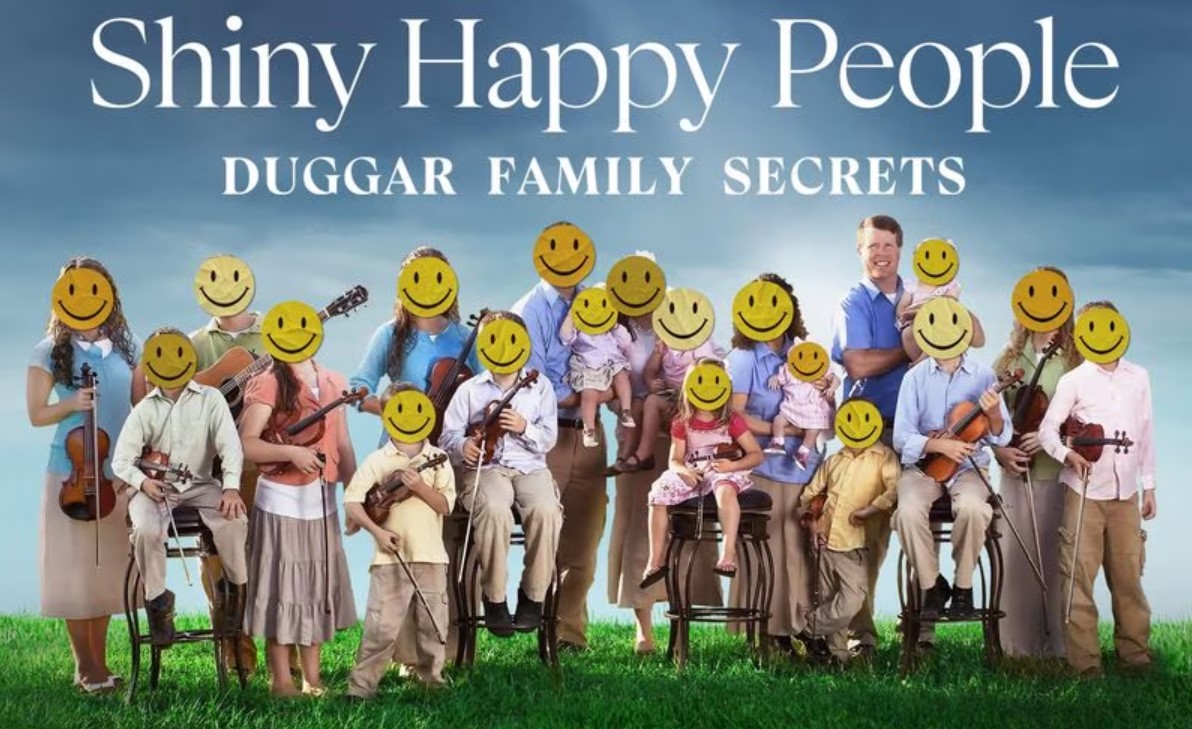The Duggars, TV, and us



Members of the Duggar family are speaking out after the release of the new four-part Prime Video documentary about their family, Shiny Happy People. Anna Duggar, wife of the family’s disgraced son Josh, who is currently serving 12-plus years in prison on two counts of possessing and receiving child pornography, slammed the family members who participated in the documentary, calling them ‘toxic’.
Another Duggar, Jed, the tenth child born to Jim Bob and Michelle, shared similar sentiments, suggesting that his sister Jill, who participated in the documentary, had ‘betrayed’ their family. The heads of the Duggar family, Jim Bob and Michelle, have also spoken out, releasing a statement on their official website, and have called the series ‘derogatory and sensationalized’.
And Jinger Duggar Vuolo, who didn’t participate in the documentary but did write about her experiences growing up in the Duggar family in a memoir entitled Becoming Free Indeed, shared her thoughts about the series during an interview with PEOPLE.
"I think everyone will have their own responses and their own timing, and that's just part of how we process," she said. "It'll be interesting to see the outcome of it." She went on to add that she expected to see ‘a variety of responses for sure’.
Though Jinger alluding to the uncertainty of the impact the documentary will have is a valid thought, her tame response to the documentary doesn’t seem to match or address the severity of what took place within the family and the harm caused by the Institute of Basic Life Principles (IBLP). Despite her distancing herself from the family, it’s still a very typical Duggar response. Back in 2015, when it was first widely uncovered that Josh had been sexually abusing girls, including two of his sisters, the family shared that same nonchalance in response to the revelations.
Her sentiments, though, and the timeline of events, brings up the question of the role TV networks like TLC play in amplifying and fostering a culture of abuse, predators and in this case, a cult. One thing the TLC network has always been great at is seeking out incredibly niche families and individuals and sensationalizing them through television. But what we know from the documentary is that Jim Bob, the head of the family, was actually very strategic in trying to generate visibility for his clan, which TLC completely fed into. This was all a part of a larger goal to gain more visibility for the IBLP. And looking back at the harm members of this family, the IBLP institution and this show has caused – you have to ask, who is at fault?
Jim Bob’s political career, during which he served as Republican Arkansas state representative from 1999 to 2003 before running for senate in 2002, put him on the map with the Discovery Network, prompting TLC to release a few specials about the Duggar family. Prior to the birth of their 15th child, TLC aired a special called “14 Children and Pregnant Again!” When the network realized how enthralled people were by this family’s lifestyle and that there was an appetite for more, they produced the series “19 Kids and Counting”.
The new Prime Video docuseries features commentary from Kristin Kobes DuMez, professor of history and gender studies at Michigan’s Calvin University, who speculated on the timing of the family’s early rise to prominence and what it meant for the IBLP.
“Jim Bob and his family are at the right place at the right time,” reflecting on the early days of the family’s time on screen. “Jim Bob is presented with a new opportunity which will give him the power to present his values to the entire country and an opportunity to make a lot of money.”
In discussing money, we learned that the handling of it was also a big issue, as described by Jill, who says that for seven and a half years of her adult life, she received no money from TLC because it all went to her dad, who refused to pay her.
She recalled an instance where she signed a contract for a five-year commitment to the show, but her dad didn’t detail what exactly she was agreeing to. She says her parents also signed on behalf of her siblings who were no longer minors and should have been signing on their own accord.
Jill describes filming the birth of their first child despite not wanting to and she says she never received compensation for it.
“After Israel’s birth, we asked TLC to pay us enough just to cover what our out-of-pocket costs were for health insurance for Israel’s birth,” she said. “They said they paid the family. ‘Paid the family’ means we don’t get anything at that point. They said, ‘Well, we paid your dad, so take it up with him,’” her husband, Derick, explained.
But money wasn’t the only thing mishandled by both the heads of the Duggar family and the network. The biggest mishandling, by far, was the sexual abuse at the hands of the eldest son, Josh. In the docuseries, it’s revealed that ahead of an appearance on Oprah, her team received some documents warning that the family had some secrets, which prompted Harpo Studios to reach out to the Arkansas Department of Human Services. That same day, the Springdale Police Department opened an investigation.
This wasn’t the first time Josh had been involved with the police, though. In 2006, there had been another police investigation that dated back to 2002. Jim Bob and Michelle knew Josh had been molesting his sisters and even admitted this to an officer, Joseph Hutchens, who happened to be a friend of Jim Bob and let Josh off the hook, surmising that the Christian counselling camp Josh had attended for five months was sufficient. It’s worth noting that Joseph Hutchens is currently serving jail time for child pornography charges himself.
It’s unconscionable that it was another production team and studio that reached out and escalated this, advocating for Josh’s victims, particularly because at the time of filming, there had already been so much documentation, including a decade-old police report, in which Josh admitted to these crimes. All of this indicates that a proper vetting of the family was never done by TLC before awarding them a primetime slot on national television. Why not?
Well, the Duggar family quite literally were, as the title suggests, shiny, happy people. They were a white, Christian family with a bunch of kids who were slowly being married off and having children of their own. They were dripping in Americana and came across as so incredibly wholesome – and that’s largely thanks to TLC selling that image to their audience, something they’ve done masterfully for years.
Take Jon & Kate Plus 8, another hit show that aired on the network beginning in 2007. Years after production finished, it was revealed that the kids were often forced to film, even when it contradicted a court mandate. Upon first glance, who would suspect that these kids were unwilling? It can be difficult to discern the effects of forced filming from what could easily be chalked up to normal child fatigue.
In the case of Here Comes Honey Boo Boo, another TLC show featuring an American family, the plug was pulled when it was revealed that Mama June, one of the stars of the show, was involved with a man who had been convicted of sex crimes.
What all of these shows have in common is the family dynamic. As an audience, we’re trusting that these parents have their kids' best interests at heart. The audience is watching for enjoyment, not with the intention of being on a vigilante justice mission that will require their help and interference to break cycles of abuse. TLC truly capitalizes on the state of relaxation we’re in when we turn the TV on. We are disarmed. We are watching and consuming passively.
As much as the sinister underbelly of the Duggar family may have appeared to be invisible to most of the audience, the ex-IBLP members who were featured in the documentary seemed to be able to spot it from a mile away.
“The Duggar family is not a bizarre fascination. It is a horrifying glimpse of a story that was told over and over and over again in so many different families,” said Josh Pease, a pastor and journalist who appeared in the series.
That, in part, explains why it was so easy for ex-IBLP members to read the warning signs. This is all recognizable to them and mirrors a lot of their own lived experiences. But it doesn’t explain why TLC continues to fail not only the very subjects of their shows, but their audience as well, by not taking any responsibility in their role of amplifying this toxic, abusive, and predatory culture. That was precisely the aim of producing the documentary, according to an interview with the producers.
"Our hope is that people really take a look at that and start to ask of themselves, 'How was this allowed to flourish?' And 'What was all of our roles in it? And 'What do we do? How do we course-correct this going forward?'" producer Blye Faust told PEOPLE.
Cori Shepherd, another producer of the docuseries, says she hopes it sparks widespread change.
"We're seeing this blow up huge on the internet right now. TikTok is just going crazy…There's just so much discussion about it that we're already seeing from an entire generation who grew up either under IBLP, or under institutions that were heavily influenced by these ideas," she said. “There's an entire generation that is already talking about this as they're starting to deconstruct their own upbringing."
Cori said another thing that’s happening is the delayed response, reaction and reflection about what, exactly, people had been consuming as they watched this show.
"A lot of young people who are now growing up, having their own families and starting to question, 'Wait a minute, what the hell was I watching?'" she said. "We were consuming misogyny as entertainment. Consuming, watching, intellectual abuse happen, educational abuse happen, and seeing it as like, 'Oh, isn't that wacky? They make tater tot casserole.'"
I think that is what makes docuseries like Shiny Happy People, Our Father, Escaping Polygamy and Leah Remini: Scientology and the Aftermath such conversation-starters, and such thought-provoking productions. It makes us turn inward to ask how we contributed to something, what the impact may have been, and to Blye’s point, how we course-correct.
Sadly, though, these questions seem to lie solely with the audience, because even though some of us might be trying to do that work, networks like TLC aren’t participating in the self-interrogation.

